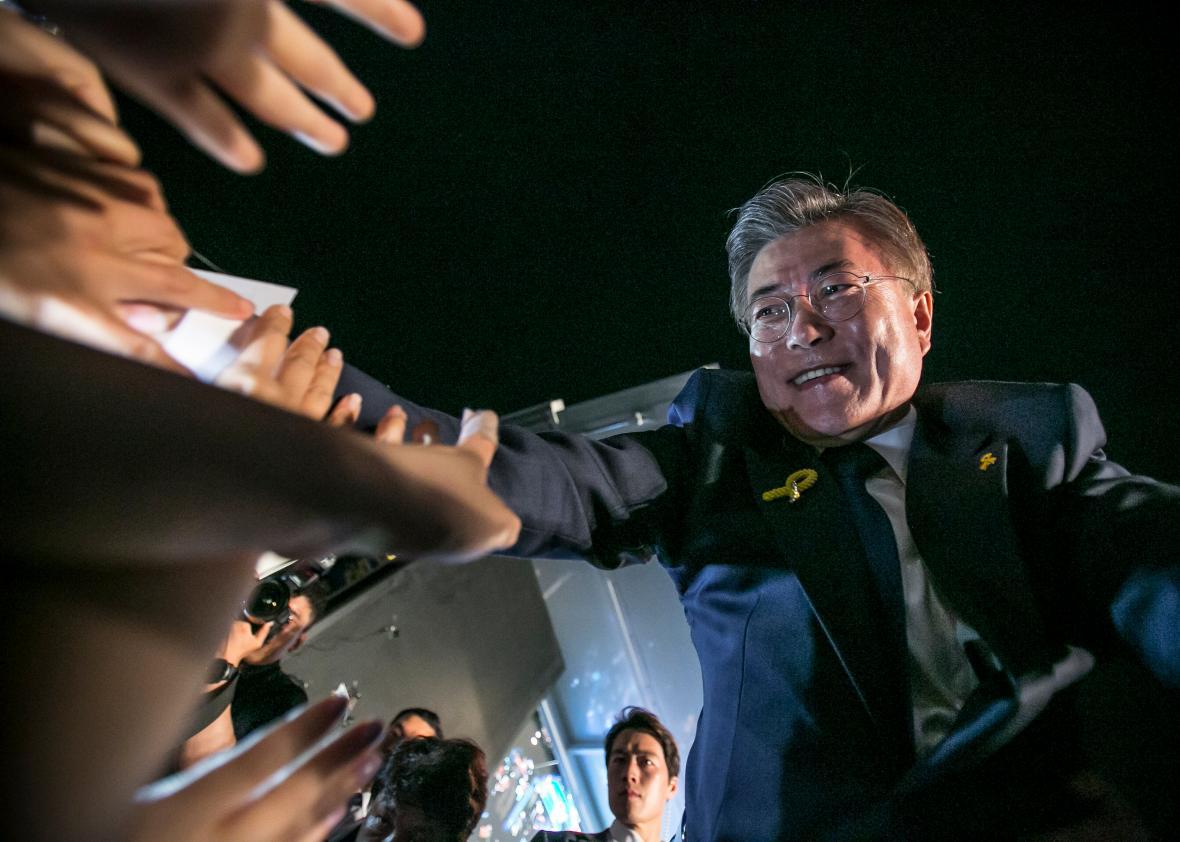Moon Jae-in has declared victory in South Korea’s general election, with exit polls giving him about 40 percent of the vote compared with 23 percent for his nearest rival. Moon’s election brings an end to months of political chaos following former President Park Geun-hye’s impeachment and removal from office for a bizarre corruption scandal involving a close confidante. Park is currently in jail awaiting trial.
The election results mean that a liberal government will replace a conservative one, but the symbolic shift is bigger than that.* Park’s political base was older voters nostalgic for the tenure of her father, military dictator Park Chung-hee. Moon was arrested for taking part in protests against the elder Park and later became a human rights lawyer. His strongest support came from young voters, many of whom took part in the protests that brought down the younger Park.
Though much of the election focused on corruption and domestic economic issues, the vote also took place at a time of heightened tension with North Korea and uncertainty about the unpredictable new president of the United States. Here, too, the biographies of the two leaders seem significant. Park, whose father’s regime was backed by the U.S. during the Cold War and whose mother was killed by a North Korean sympathizer, favored a hard line against the north and close military cooperation with the United States. Moon, whose father was a refugee from the north, isn’t a North Korean sympathizer by any means but favors a more conciliatory approach. He also recently published a book saying that South Korea needs to learn to say “no to America.”
As with all things Trump, it’s hard to predict how the American president—who has been unexpectedly focused on the North Korean issue lately—will get along with his new counterpart in Seoul. Moon’s desire to negotiate with the north, and even meet with Kim under the right circumstances, isn’t actually that far from things Trump has said. Moon pointed this out to the Washington Post last week, saying, “I believe President Trump is more reasonable than he is generally perceived.”
Moon has also said that he wants South Korea to take a more prominent role in the North Korean crisis rather than letting the United States and China take the lead. This may meet with some approval from a U.S. administration that has made clear it wants U.S. allies to fend for themselves more.
On the other hand, as he has cozied up to Chinese President Xi Jinping lately, Trump has been strangely and unnecessarily dismissive toward South Korea. Many South Koreans were outraged when Trump repeated a historically dubious claim—that he apparently got from Xi—that all of Korea had once been “part of China.” Trump has also suggested he might terminate a trade deal with South Korea and that he wants the country to pay for the American THAAD missile defense system located there. (Moon, unlike his predecessor, is skeptical about THAAD, so his response to that idea is likely to be, “let me know when you want to come pick it up.”)
There’s an optimistic scenario in which a militarily aggressive U.S., a less supportive China, and a newly conciliatory South Korea work together to put pressure on North Korea and achieve some progress on the nuclear issue. But it would help if Trump could avoid insulting U.S. allies for at least a few weeks.
*Correction, May 10, 2017: This post originally stated that the election had replaced a liberal government with a conservative one. It is the opposite.
